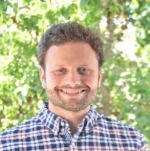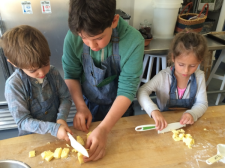
Berkeley-Haas Education Team at MIINT
A Move into Impact Investing
My momentous experience with the Haas Impact Investing Network (“HIIN”) started in late September. I came to Berkeley-Haas to pursue a career in impact investing, so HIIN was an obvious decision. At work, I was frustrated with the nonprofit funding model – I had an undergrad degree in finance and I wanted to incorporate social impact into my work – a career in impact investing was a natural fit. However, I neither had the experience nor the tools to make this change. I quickly learned that HIIN was much more than just another case competition. My HIIN experience provide the tools I needed to make a career switch into impact investing.
HIIN is the Berkeley part of an experiential training program called the MBA Impact Investing Network & Training (“MIINT”). It’s an international competition where MBA teams from the US and Europe spend 6 months going through the impact investing process. Teams identify, conduct due diligence on, and recommend for investment an existing early stage for-profit organization that is building social impact into its business model and is looking to raise funding in order to scale up. The winning companies receive seed investments as part of an existing funding round. In addition to the competition component, MIINT provided access to various online and in person trainings on the stages and nuances of impact investing. The competition provided access to professionals in the industry both in formal speaker and panel settings to informal lunches and coffee chats. Furthermore, the competition provided access to networking both internal and external to Berkeley-Haas. I was able to connect with fellow students interested in the same topic. Soon it became an addendum to my MBA curriculum.
Focusing on Education
I joined the MIINT education team based on my personal interests. The first step was to source a company that fit a robust set of criteria. Our team assessed over 50 companies in the education space. I was doing research for the competition that allowed me to learn more about the education industry in the US. I learned about various tools for students, teachers, administrators, professionals, etc.  I learned about trends such a mass open online courses (MOOCs) and adaptive learning platforms. Ultimately we decided to work with an organization named KickUp, an analytics platform for school district directors to better tailor the professional development teachers. We worked closely with Jeremy Rogof, the founder and CEO, to analyze the market, understand the value proposition, conduct financial and social due diligence. Through this deep dive into the company, I came to understand the challenges of creating a company that provides a differentiated value and a social benefit in a market that is willing to pay for this product.
I learned about trends such a mass open online courses (MOOCs) and adaptive learning platforms. Ultimately we decided to work with an organization named KickUp, an analytics platform for school district directors to better tailor the professional development teachers. We worked closely with Jeremy Rogof, the founder and CEO, to analyze the market, understand the value proposition, conduct financial and social due diligence. Through this deep dive into the company, I came to understand the challenges of creating a company that provides a differentiated value and a social benefit in a market that is willing to pay for this product.

Haas Impact Investing Network Fellows 2016
My first wake up call came when we presented the company at the Berkeley-Haas investment committee presentations. We believed the company was strong, the team was qualified and the product and impact were clear. However, the probing 20-minute Q&A following our presentation strongly challenged our assumptions and highlighted weaknesses which we had failed to discover. Ultimately, KickUp’s strong value proposition that addressed a massive problem in public school education today allowed us to win the local round. We represented Berkeley-Haas at the final round at Wharton. We spent the next three weeks engrossed in research, interviews and further analysis to develop answers to the gaps the judges had identified. Our further work proved to us that KickUp was a strong investment and we presented the company to a group of investors at Wharton.
The MIINT Finals at Wharton
The two day competition in Philadelphia was a fantastic experience for the whole team. The first day consisted of coffee chats and networking events where we met the other teams and judges. Their credentials and level of commitment to the tournament were impressive. The second day consisted of the final investment presentations. We spent weeks honing our presentation and were excited to show it to the judges. In our final presentation we felt we did a good job describing the company and answering the tough questions that followed.
In the end, we were not victorious. As the day wrapped up, we were awed with a presentation which showed what happened with previous winners, including Learnsprout who were acquired in a multi-million dollar deal by Apple earlier this year. Even though it didn’t win, hopefully KickUp will enjoy similar success!
Although we did not win, the experience was invaluable. Our team learned a great deal about the impact investing space, how investments are sourced, studied and eventually executed. Classes are great at providing concepts, tools and frameworks, but it is opportunities such as these that allow students to take their learnings and apply them in the real world. It was also wonderful to work closely with passionate MBAs from four continents, as well as an inspiring entrepreneur, and learning so much in the process. It is countless such activities that makes Berkeley-Haas a truly experiential program.










